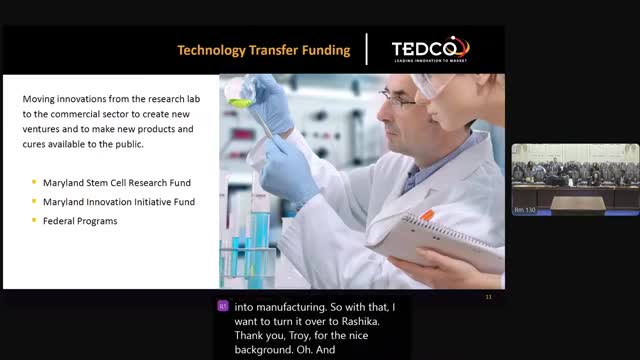TEDCO tells Ways and Means its programs are driving jobs, entrepreneurship and new manufacturing projects in Maryland
Get AI-powered insights, summaries, and transcripts
Subscribe
Summary
TEDCO CEO Troy L. Stovall briefed the Ways and Means Committee on Jan. 15, outlining TEDCO’s 2024 activity, economic-impact estimates and new program investments including the Equitec Growth Fund, EcoTech Growth Fund, maker-space grants, Cyber Maryland and a concept-capital pilot for Prince George’s County.
Troy Lamel Stovall, CEO of the Maryland Technology Development Corporation (TEDCO), told the Ways and Means Committee on Jan. 15 that TEDCO’s work in 2024 expanded programs designed to move university and early-stage research into market-ready products, increase manufacturing capacity in the state and create higher-wage jobs.
Stovall said TEDCO’s programs and investments have produced “about $2,700,000,000” in measured economic impact and that figure is “understated,” adding that TEDCO has a track record of clean audits and is focused on being a good steward of state and federal funds. “These are the individuals that are touching our entrepreneurs, these are the people that are touching our innovators,” Stovall said, describing TEDCO as acting as “one” gateway for entrepreneurs entering the state ecosystem.
TEDCO highlighted several initiatives it said were developed or scaled in 2023–24: the Equitec Growth Fund, EcoTech Growth Fund, a concept-capital pilot, maker-space investments targeted to underserved communities, Cyber Maryland workforce work and a Manufacturing Assistance program for life-science companies.
Why it matters: TEDCO framed these programs as part of a strategy to translate Maryland research institutions’ work into startups, regional manufacturing and higher-paying jobs that do not always require four-year degrees. Stovall said TEDCO’s investments aim to create roles paying “$80,000 to $90,000 a year” and to keep firms and jobs in Maryland as technologies scale.
Most significant program details
- Equitec Growth Fund and awards: Stovall thanked the committee for providing $5 million in funding over nine years for an EcoTech/Equitec initiative. TEDCO received 75 applications for the initial round and awarded 14 projects, distributing $7 million across infrastructure and workforce opportunities, he said. TEDCO described those awards as seed or “stitching” investments intended to attract additional sustained funding.
- EcoTech Growth Fund and maker spaces: TEDCO described an effort to place maker-space resources in communities that lack them and said the maker-space initiative has entered a second tranche of awards intended to expand local infrastructure.
- Concept capital pilot and Prince George’s County: TEDCO said it launched a small “concept capital” competition funded internally that awarded five small grants (top award $50,000; others $25,000) and is piloting a Prince George’s County–focused tranche. Stovall said TEDCO is also convening angel investors to partner with small awards to help entrepreneurs become venture-ready.
- Manufacturing Assistance Program: TEDCO said it launched a Manufacturing Assistance grant program in 2023 aimed at helping life-science companies scale production and keep facilities in Maryland. TEDCO reported $3.2 million invested so far through the Manufacturing Assistance Program and cited Reprocell (Prince George’s County/Bellsville) as a recent grantee that used manufacturing funds to establish a facility and hire locally.
Committee questions and TEDCO responses
Committee members asked about common barriers facing early-stage companies. Stovall emphasized TEDCO’s role at “very early stage” venture development: founders need customer discovery, business plans, team-building and coaching. He said the state lacks early-stage capital beyond TEDCO and that many entrepreneurs are first-timers who need “hand-holding.”
Legislators also asked about local outreach and access. Stovall acknowledged gaps: TEDCO has not fully reached some communities (he specifically named the Hispanic community) and said outreach and marketing remain resourcing priorities. He said TEDCO has raised allocations and programs aimed at increasing participation by women, people of color and rural entrepreneurs and that since his tenure roughly half of TEDCO’s deals and dollar value have gone to founders who are women, people of color or from rural areas.
Ending: Stovall closed by thanking the committee for its support and saying TEDCO stands ready for questions and further engagement. He invited committee members to follow-up visits and discussions about local pilots and federal-lab engagement work.
